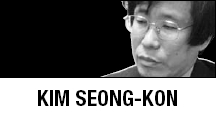The other day while walking on the campus of Seoul National University, I saw a big poster put up by the College of Humanities Student Association. The poster harshly criticized the incorporation plan of the university scheduled to be effective as of 2012, asserting that students do not want any radical change on campus.

Then I found an amusingly contradictory signature at the bottom of the poster: “The College of Humanities Student Association, the unstoppable heart of revolutionary change.” Reading it, I could not help but wryly smile. With a slogan like “the unstoppable heart of revolutionary change,” you would expect the student association to advocate “radical change” and support the incorporation of the university.
There may be two compelling reasons for this seemingly contradictory phenomenon. One reason is that by “revolutionary change” or “social change,” radical students almost always mean “anti-capitalist proletarian revolution.” It is only natural, therefore, that they oppose the incorporation of SNU, which they think will enslave the university to ruthless capitalist exploitation. Another reason is that contrary to popular belief, most radical students in Korea are, in fact, hopelessly old-fashioned conservatives and not open-minded progressives. Naturally, they do not want any radical change that may infringe upon their vested rights and privileges.
Personally, I support the incorporation of Seoul National University. Currently, SNU faculty members are tied up with all sorts of bureaucratic procedures and government red tape that seriously hamper their research activities. For example, government regulations stipulate that all rooms shall be set at 26 degrees Celsius in government-related institutions. But professors cannot possibly conduct research in such sweltering conditions, or run a lab that requires lower temperatures.
I once attended a conference where I saw Iraqi delegates profusely perspiring and vigorously fanning themselves inside a government conference room in which the air conditioner was set at 26 degrees. It is a shame that our government offices, which are essentially the face of our country, must run under second-class conditions.
In fact, absurd bureaucratic procedures are ubiquitous at national universities. When a professor leaves the country on his sabbatical, he must fill out and sign a number of silly papers that ask questions such as “Why will my family accompany me?” The correct answer is essentially: “Because they are my family, duh!” You also have to sign an oath that you will not disgrace your integrity as a government official. How can you ask a professor to sign such an insulting paper? We are going on a sabbatical, meaning you are free from all obligations and can rest or go overseas for research freely. Yet even a sabbatical is an official business trip for national university professors. To make matters worse, a national university professor cannot travel overseas even during summer vacation without prior authorization, which requires quite a lot of paperwork.
For some dubious reason, radical leftists on campus paradoxically approve of such bureaucracy by denouncing the incorporation of the university.
While there is the stubborn “unstoppable heart of revolutionary change,” there are a host of soft and loose muscles called “the soft generation” in Korean society. The nave Korean young people who belong to the soft generation are those who have been nurtured under their mother’s overprotective care, and thus have never been exposed to the harsh reality. Suppose there is a war on the Korean Peninsula, could we trust this soft generation to courageously defend their nation?
According to an article on the Korea Real Time homepage, a recent poll revealed a disheartening trend ― “about 44 percent, or 892 students, said they would flee the country if a war with North Korea broke out. Only 15 percent said they would join the war or help the country in other ways.”
The article also disclosed another discouraging piece of news: when asked to name South Korea’s jujeok (primary enemy), 687 responders pointed to Japan and 307 students chose the United States; only 341 thought of North Korea as their primary enemy. Due to our demagogue politicians and journalists who try to provoke the nave people with anti-Japanese and anti-American sentiment for political gain, our young people are now hopelessly confused when it comes to the crucial issue: “Who is our main enemy?”
A newspaper report states that among the U.S. soldiers who served in Iraq and Afghanistan, 12,000 attempted to commit suicide, and one out of eight received psychiatric treatment. One may say that American soldiers, too, belong to the soft generation. South Korean soldiers are no different from American veterans; they, too, would suffer mental trauma and need psychiatric treatment if a war broke out.
Regrettably, we have two types of young people in today’s Korea. One is the aggressive, dedicated type who is ready to fight for a socialist revolution, and the other is the meek, confused soft generation that even cannot discern our main enemy with our allies. If the above poll accurately reflects our present reality, we have every reason to seriously worry about our future. We hope it is not true.
By Kim Seong-kon
Kim Seong-kon, a professor of English at Seoul National University, is editor of the literary quarterly “21st Century Literature.” ― Ed.








![[Weekender] Korea's traditional sauce culture gains global recognition](http://res.heraldm.com/phpwas/restmb_idxmake.php?idx=644&simg=/content/image/2024/11/21/20241121050153_0.jpg)